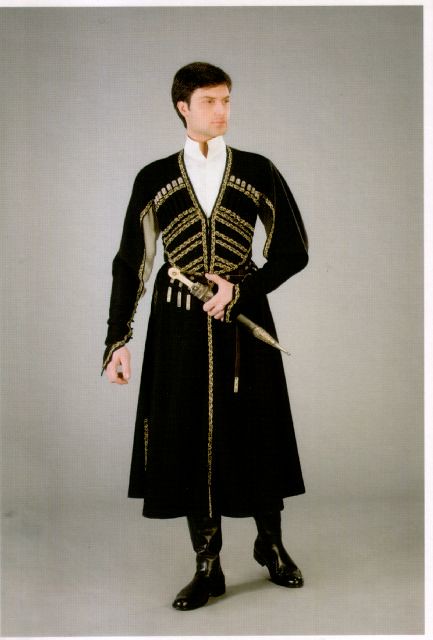What color cloth were all gifts given to guests wrapped in?
Red. Caucasians were known for their hospitality. Guests were also greeted with song and dance, along with tea.
How long do caucus weddings last?
Two-three days.
Russian cuisine in the 19th century was influenced the most by which country?
France. Russian cuisine borrowed a lot of elements from other European countries, but France introduced a lot of new food like salads and garnishes which had never been seen before by Russians. Ex. Olivier or Russian salad
What was the social structure of caucasus?
Class caste system
(They had aristocratic and merchant classes that had endogamous marriage, a strict social hierarchy, and highly codified behaviors)
True or False: Caucasian women's outfits had pockets sewn into them.
False: Women would use tricks, like making false sleeves and storing small items inside. They would also make pockets in their headdresses, or make a pretty apron that had a bonus pocket.
Among which groups of people are weddings encouraged?
Weddings among cousins were preferred.
What was typically the first course served?
Soup. There was a wide variety of soups that consisted of fresh and pickled cabbage soup, fish soup (ukha), brothy stews, and much more.
What was the government of the late 19th century?
Absolute monarchy(In the late 19th century the Russian people were ruled by the Romanov Dynasty. The Tsar (Czar) took the title 'Emperor and Autocrat of all Russia' and imposed autocratic rule - government by one man. Unlike in most other European countries, power had not passed from the monarchy to the people.)
What could a woman do to stop two men from fighting one another?
Throw her headdress or kerchief between the two fighting men. If she did this, the two men were required to stop fighting immediately.
True or false: Dowries are preferred in Caucus weddings.
True
What was the most common non-alcoholic beverage?
Kvass. Kvass was the most common drink in every class of society. It is made from the fermentation of rye bread. Apart from drinking kvass, families (especially the poor ones) used it as the basis of many dishes they consumed such as summertime soups.
At what rank were you considered to be a part of the nobility?
Rank 4 or higher (They were graded into fourteen different ranks with the Tsar's ministers at the top. Each rank had his own uniform and those that reached the fourth grade and above became members of the nobility. Basically a type of Major, Admiral, Chancellor or Councillor. There 14 ranks were also top of russia still, everyone else was a peasant)
What is the name of the traditional coat that men would wear to gatherings and festivities?
Chokha. This coat features a high neck with thick wool. It is usually black or grey, but can also be other colors like red, purple, or green.

What presents were given to the brides in the wedding?
Clothing, two-three pieces of soap and sweets were common gifts.
What is the name of a cold vegetable soup prepared with kvass?
Okroshka. Apart from drinking kvass, families (especially the poor ones) used it as the basis of many dishes they consumed such as summertime soups.
Which family was the most rich and powerful in 18th century Russia?
The Strogonovs.(They owned huge swaths of land and ran large salt and iron mines. The were so rich they built that rivaled those of the tsars aka the ruler of russia. Their grandest palace in St. Petersburg has been turned into the Russian Museum. They commissioned so many icons they had an icon school named after them.)
What is the name of this hat?
Papakha hat. This hat was usually made out of sheepskin. It was even a part of the Red Army uniform until it was removed in 1917. They were reinstated again in 1935, but then removed in 1995, until being reinstated again in 2005.
What do the winners of wedding horse races receive?
Winners receive a tray of sweets and a ram.
Because of cold weather conditions, how was food preserved?
Salting, smoking, soaking, and fermenting. Households would preserve as much food as possible to last through the winters. This included salting, smoking, soaking, and fermentation of products.
What happened to Serfs who were not able to pay their “soul tax”?
They would be sentenced to 20 years of military service, basically death.
